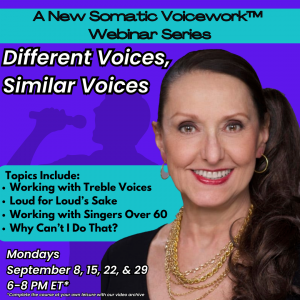Jeanie LoVetri is so excited to announce her new Webinar Series: Different Voices, Similar Voices.
The webinar series kicks off on Monday, September 8th from 6:00-8:00 PM ET.
Somatic Voicework™ The LoVetri Method
BREAKING NEWS! In an effort reach more singers and voice teachers from far and wide, we are offering the 2025 LoVetri Institute for Somatic Voicework™ entirely ONLINE! Join us to learn how body, mind, and spirit come together to make human voices sing! For more information and to register:
Click here for INFORMATION & REGISTRATION
Founder – Jeanie LoVetri
Overview of Somatic Voicework™
Somatic Voicework™ The LoVetri Method is an organized method of vocal training for Contemporary Commercial Music (CCM) styles, (those styles that used to be called “non-classical) based upon somatic (physical) awareness and aural discernment. The training is completed in three levels. Read more…
2024 Voice Foundation Workshop:
If you’re wondering how to sing authentically in various musical styles, please watch this video of Bharati Soman and Maria Damore at the 2024 Voice Foundation Symposium. Bharati demonstrates pop-mix (“Count on Me”-Bruno Mars), belt (“Go Into Your Dance”-42nd Street), and classical/opera (“Caro Nome”-Rigoletto). Maria demonstrates belt (“Some People”-Gypsy), classical/opera (“Vissi d’Arte”-Tosca) and pop/mix (“Midnight Blue-Melissa Manchester”). Jeanie LoVetri, founder of Somatic Voicework™, masterfully guides them through exercises to prepare for each excerpt. Bharati’s home base is classical and Maria’s home base is pop-mix, but both skillfully cross over to the other genres. Special thanks to Jimmy Damore, for accompanying and to Valerie Trollinger for videotaping! The Somatic Voicework™ functional training approach is extremely effective for all genres because it conditions the instrument (the voice) to be strong and flexible, much as other athletes train the muscles used in their sport. Stylistic parameters are incorporated as the vocal instrument is ready to assimilate them.